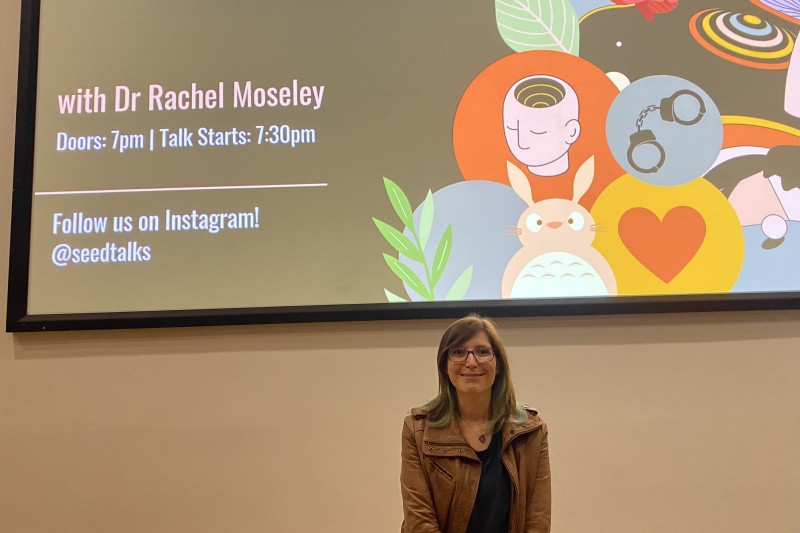Seed Talks hosted their event ‘Autism and Women with Dr Rachel Moseley’ at BU on Wednesday 9 October on Talbot Campus.
Dr Rachel Moseley, Principal Academic in Psychology spoke about the lesser-known female experience of autism, and why so many go unseen and unheard, sharing her personal experiences growing up and being diagnosed with autism in her late 20’s.
 Dr Rachel Moseley, Principal Academic in Psychology
Dr Rachel Moseley, Principal Academic in Psychology Rachel began her talk by defining what autism is and common displays of the neurodevelopmental condition. She spoke about social imagination and autism - the ability to imagine what others may feel, think or experience, explaining that often people with autism care deeply about how they are perceived by others. Women and girls often learn to copy social behaviours, having learnt that this may protect them from bullying or exclusion. Rachel spoke about her own experience of autism and camouflaging, also known as masking, to minimise the visibility of difficulties associated with autism in social situations. She shared her experiences of burnout during her studies and later within the workplace.
Additionally, Rachel highlighted the impact of white autistic male tropes in media, for example in the Big Bang Theory, Sheldon Copper is a renowned scientist, or in The Good Doctor, Shaun is an expert surgeon. The portrayal that autistic people have exceptional abilities date back to our early understanding of autism. In the early 1900s all autism descriptors were based on the traits of men and boys. Hans Asperger called children with autism “little professors”. The behaviours/interests can be less obvious in girls/women as they often internalise symptoms. It wasn’t until Dr Lorna Wing coined the term the autistic spectrum in the late 1900s that the concept of an autistic spectrum was acknowledged, that people with autism may not meet every criteria of earlier descriptors/traits of autism in men and boys.
Rachel said, “We’re finding that women are often getting diagnosed as autistic later in life. Many have a string of previous psychiatric diagnoses; while some of these reflect the reality that mental illness is very common in autistic people. We also know that autistic people are sometimes incorrectly diagnosed with conditions like personality disorders. Outdated stereotypes about autism and cultural gender expectations between boys/men and girls/women contribute to under-diagnosis of autistic people assigned female at birth. It’s culturally normal for girls to be ‘shy’ or ‘demure’, so they stand out less than boys who are withdrawn. Girls are also more likely to be accepted by non-autistic girls up until the teenage years, meaning that again, they stand out less. Screening tests are still based on male presentations of autism.”
Although diagnosis can provide relief and increased understanding and self-acceptance, after a diagnosis people often experience feelings of grief, regret and anger about previous suffering that could have been avoided, such as traumatic and painful life experiences, mental illnesses and misdiagnoses. Rachel highlighted that although there are various screening tools for diagnosing autism, it’s also dependent on the assessing adult/team.
Autism is often detected during times of significant change, i.e., during puberty, teenage years or menopause. Rachel explained that these key events during a women’s lifespan can cause coping strategies such as camouflaging to fail. Women find they cannot function in the same way. She explained that diagnosis is important for finding support i.e., through community groups, therapy or other help. It allows people to rewrite some of those self-criticising narratives and be more self-compassionate.
Lastly, Rachel spoke about steps to improve autism research. For example, the acceptance of ‘possibly autistic’ self-diagnosed individuals in research studies in recognition of the fact that many older autistic people are undiagnosed. And the inclusion of people of all genders, sexes, races, ethnicities and backgrounds. Throughout her presentation, Rachel highlighted that autism is a spectrum and there is a wide variation in how people experience their autism (as well as how the people around them experience it). Therefore, varying levels of support are needed.
The event finished with audience questions. People of a variety of ages from teenagers to older persons shared their own or loved one’s experiences of autism and their journey to diagnosis. The audiences’ reactions to Rachel’s personal experiences showed a shared understanding of her journey and an appreciation for shedding a light on this conversation.
An audience member said, “Although the talk highlighted the challenges in getting an autism diagnosis and how autism can be misunderstood, it felt empowering to learn more about autism in women and girls. Through connecting with other people’s experiences, this talk helped those who have been affected by autism feel less isolated.”
Further information:
- Dr Rachel Moseley’s research
- Resources to support, including if you’re a professional working with autistic people
- BU’s Department of Psychology
SEED talks are hosting another event on Talbot Campus on Wednesday 13 November, ‘How trauma affects the body: The psychosomatic nature of trauma’.



